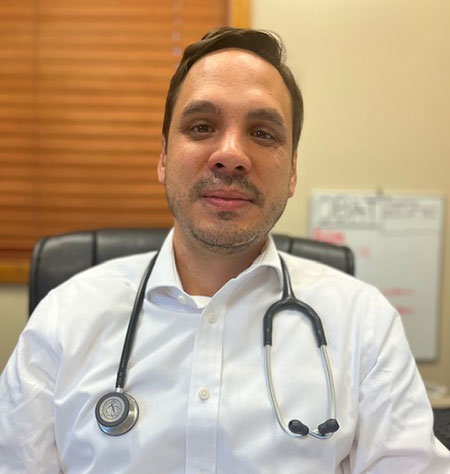PCSS-MOUD Implementation provides training and mentorship in creating systems and implementation guidance, as well as educational resources and support at no cost to healthcare professionals and organizations in evidence-based practices in the prevention and treatment of substance use disorders, particularly opioid use disorder.

Back in 2020, Andrew Johnstone, APN, FNP, MSN, BC, was the only prescriber in their practice treating their patients with OUD, but he was passionate about helping those in need. While he initially had 20 patients, the practice currently treats 90. Jefferson Health leadership was 100% on board when he broached the subject of treating more patients with MOUD. Johnstone had been working with Erin Zerbo, MD, an Addiction Psychiatrist who is also a PCSS mentor, and when Johnstone saw PCSS was looking for new clinical sites for PCSS-MOUD Implementation he jumped in with both feet.
“We already had the culture of being very caring, with a good front staff,” he says, something that he attributes to the clinic’s success. “PCSS gave us a platform for implementing what we already wanted to do.”
In years past, it wasn’t uncommon for patients with OUD to be dismissed if they relapsed, Johnstone said. Now, staff has a better understanding that relapse is part of the continuum of care and recovery. “As clinicians, we can make it more complicated than it has to be, even more conflict related,” Johnstone says. “We’re in a great position as providers to treat substance use disorders because, what can the patient do to create conflict? Really, nothing if we practice the model the way it’s supposed to be. If a patient relapses, that’s okay. We say, ‘I’m proud of you for coming back.’ If their urine test comes back positive, we say, ‘let’s talk about it, let’s figure out what we can do.’ They’re not taking the medication? Why not? What’s going on? So, you’re in the role of a cheerleader.”
PCSS helped Jefferson develop a handbook for clinicians when treating OUD. The key is, says Johnstone, that the handbook is not a strict guidance document; treating OUD involves flexibility and patience. In addition, PCSS was instrumental in helping the clinic build relationships with social services and behavioral health organizations, to give their patients access to behavioral health treatment and providing a more holistic method of treatment.
Now, nearly two years after beginning the process, Jefferson is in the position of helping nearby clinics begin the process toward implementing MOUD. The clinic is working with one clinic whose staff was initially resistant to treating OUD. “PCSS helped us deal with the resistance.”
Johnstone’s biggest takeaway? That there are solid resources for treating patients with OUD and a community of support that is lifechanging for patients, rewarding as a provider, and less complex than what one would think.
Learn more about PCSS-MOUD Implementation and find out how we can help you and your patients.

